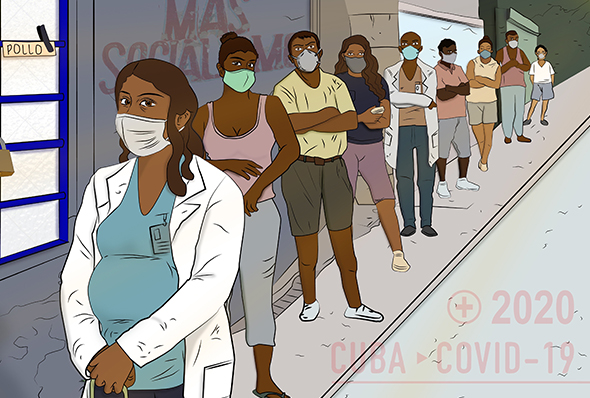RIO DE JANEIRO, BRAZIL – Dr. Francisco Durán, director of Epidemiology of the Ministry of Public Health of Cuba (Minsap), warned in Havana “that January will be the worst month since the covid-19 epidemic began”, While the incidence rate of the virus grows and hospital capacities are expanded urgently.

At this time, the incidence of the virus per 100,000 inhabitants in the last 15 days exceeds 185.07 cases in the eastern province of Guantánamo and 110.72 in Havana (west), when the manageable average is 50, according to the World Health Organization.
The incidence in Cuba reaches 59.09, with 194 deaths, 634 new infected today (which set a new record) and alarms that were triggered from the return of thousands of nationals scattered around the world.
Own protocols
Ariel S. Núñez, 38, landed in Cuba knowing that in his country of birth the sanitary procedures are different from those in Spain, where he resides.
“The only thing that like here is a publicity bombardment, with which they want to convince you that the world is going to end, and people are tired of all that,” added this graduate in Documentation, who said he distrusted what they tell him on television in that country about the pandemic.
Núñez added that “to the sick confined to their homes, they are treated there by video calls and, if you have to medicate yourself, they send you prescriptions to buy at the pharmacy. Although yes, they are much cheaper than in normal cases.”
In accordance with Cuban protocol, Núñez has been confined in his residence in Havana for seven days awaiting the result of the third PCR to which he has been subjected since he left Madrid. The neighborhood doctor, Belkis Yáñez, went to take the last sample at his house yesterday.
At that time, like his parents, he remains isolated until negativity is confirmed and the Minsap endowed the family with one of the nationally produced medicines with which Cuba is fighting the virus.
Nasalferon is “a recombinant human IFN-alpha-2b-formulation for nasal administration that, thanks to the immunomodulatory and antiviral properties of IFN-alpha, achieves protection against exposure to SARS-CoV-2,” say its creators .
But despite strict procedures on the island, the established times are not always met. Since the PCR test was carried out at the airport upon arrival on the night of Monday, January 18the, this Sunday the 24th Núñez did not know the results, which officially it is said should be in 48 hours.
Until December, the Cuban state said it had spent more than one billion pesos to support the free medicines and hospitalization of 21,261 infected since the epidemic began in March.
New strain
Cubans fear that the rapid spread of the virus is also due to one of the three new strains that have been reported on the planet. “We detected the South African variant in a traveler that came from that country,” said Dr. María Guadalupe Guzmán.
The specialist warned that “other variations of the SARS-COV-2 spicule could appear in Cuba”, in addition to the English and South African ones.

